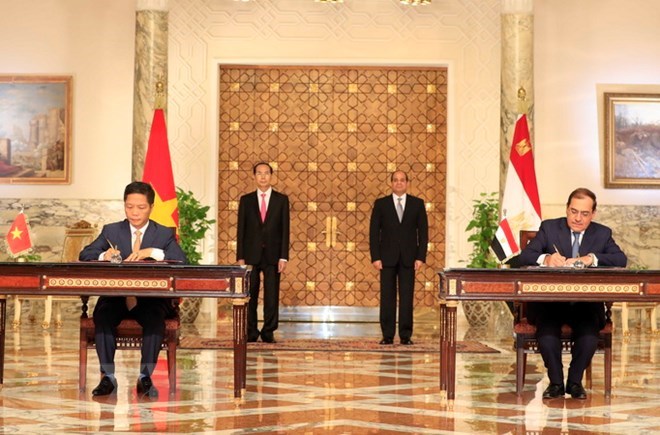
Vietnam and Egypt have issued a joint statement on the occasion of the State-level visit to Egypt by President Tran Dai Quang and his spouse from August 25-28 at the invitation of President Abdel Fattah Al Sisi.
 |
| Presidents Tran Dai Quang and Abdel Fattah Al Sisi witness the signing of cooperation documents between Vietnam and Egyp. |
Vietnam and Egypt have issued a joint statement on the occasion of the State-level visit to Egypt by President Tran Dai Quang and his spouse from August 25-28 at the invitation of President Abdel Fattah Al Sisi.
The joint statement said President Quang held talks with President Abdel Fattah Al Sisi, and met with Speaker of the House of Representatives Ali Abdel Aal and Prime Minister Mostafa Madbouly.
During the talks, the two State leaders discussed in depth bilateral, regional and international issues of common concern.
The two leaders affirmed that President Tran Dai Quang’s visit is an important landmark in bilateral ties on the occasion of the 55th anniversary of bilateral diplomatic relationship. They expressed the belief that the outcomes of the first visit by a Vietnamese President will help consolidate political trust, expand cooperation in trade, investment, agriculture, education and training, and promote cultural and people-to-people exchanges between the two countries.
The leaders agreed to increase the exchange of all-level delegations through the channels of their governments, parliaments, localities, people and businesses, while optimising existing cooperative mechanisms such as the inter-governmental committee and political consultation, thus strengthening their strategic trust.
They expressed satisfaction at the two countries’ sound cooperation at regional and international forums such as the United Nations, the Non-Aligned Movement, the African Union and the Association of Southeast Asian Nations (ASEAN), particularly their support of each other in running for seats in UN agencies. Egypt valued Vietnam’s candidacy to be a non-permanent member of the UN Security Council in 2020-2021 term. The two sides called on the international community to join hands to prevent and settle armed conflicts by peaceful measures in line with the UN Charters and international law.
The Egyptian side appreciated Vietnam’s backing of Egypt’s joining the ASEAN Treaty of Amity and Cooperation. The country pledged to support Vietnam in increasing cooperation with Africa and to work as a bridge between Vietnam and the African Union.
The two leaders agreed to continue promote bilateral ties in the fields of trade and investment, and committed to creating all possible favourable conditions to their businesses to access each other’s markets.
To soon achieve the goal of 1 billion USD in bilateral trade, the two leaders held that the two countries should take synchronous measures, including advocating liberalization and facilitation of trade and investment, supporting a rule-based, fair and inclusive multilateral trade system in which the World Trade Organisation plays the central role. They agreed to increase the exchange of business delegations and the sharing of information, and to hold regular trade fairs and exhibitions, while seeking business and investment opportunities in new fields such as garment-textiles, leather shoes, manufacturing mechanics, consumer goods, food processing, among others.
The two sides highly valued bilateral cultural cooperation and agreed to early organize cultural days/week and exchange in their respective countries.
The two leaders witnessed the signing of several cooperative deals between their ministries, agencies and localities.
Discussing in depth regional and international issues, the two sides held that peace and stability in Southeast Asia, the Middle East and Africa or any other regions in the world is essential for human kind’s development and prosperity. They vowed readiness to work together for progress and prosperity of their respective regions.
The two sides affirmed the importance of international cooperation in fighting terrorism, which is a common threat of peace-loving nations. They supported seeking peaceful solutions to the crises in several Middle East countries to ensure those countries’ unification.
The two leaders reiterated support of the legitimate rights of the Palestinian people and the need for peaceful negotiation in order to reach a fair, comprehensive and final agreement for the Palestine issue on the basis of the two-State solution and the borderline before 1967 with East Jerusalem being the capital of the State of Palestine.
The two sides reiterated the wish and resolve to maintain a sea order in accordance with principles of international law as expressed in the UN Convention on the Law of the Sea.
(Source: VNA)





